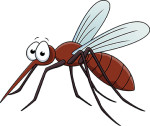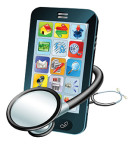Bug Bites, Doing Nothing, Make Amends, Medical Apps
Posted on August 1, 2014 by bob in NewsUCanUse
Quit Bugging Me! Tips on Coping with Bug Bites
Warmer weather has folks venturing outdoors, and while the risk of running into a snake, bear or other menacing animal exists, the critters far more likely to be encountered in the great outdoors are ticks, mosquitos and other insects.
Many bugs pack a powerful bite or sting. Janyce Sanford, M.D., chair of the University of Alabama at Birmingham Dept. of Emergency Medicine, recommends  an insect repellant with DEET, along with long pants and long-sleeved shirts, as the best way to ward off most pesky insects. DEET with a concentration of 10 to 30% is approved for use on children ages 2 months and older. Ten percent DEET will last about two hours, and 24 percent DEET lasts around five hours.
an insect repellant with DEET, along with long pants and long-sleeved shirts, as the best way to ward off most pesky insects. DEET with a concentration of 10 to 30% is approved for use on children ages 2 months and older. Ten percent DEET will last about two hours, and 24 percent DEET lasts around five hours.
The best way to remove a tick, says Sanford, is to use tweezers and pull straight up in an easy motion. She recommends carrying an epinephrine auto-injector, commonly known as an EpiPen, when camping or hiking, for those who have previously had a severe reaction to a bee or wasp sting. EpiPens require a prescription from a physician and can be purchased at a drugstore. Sanford says a good first-aid kit is a must if you spend time outdoors. Ready-made kits are available at outdoor stores, or you can assemble one from materials on hand. Include assorted bandages and basic medicines such as Tylenol, Benadryl and aspirin. Albuterol will help those with group members who have asthma or COPD. Include a 1 percent hydrocortisone anti-itch cream, foldable splints, alcohol wipes and cleaning agents.
Doing Nothing Difficult to Do
Most people are not comfortable in their own heads, according to a new psychological investigation led by the University of Virginia. The investigation found that study participants from a range of ages generally did not enjoy spending even brief periods of time alone in a room with nothing to do but think, ponder or daydream. Most participants found it difficult to concentrate and their minds wandered, though nothing was competing for their attention.
“Even older people,” said U. of Virginia psychologist Timothy Wilson, “did not show any particular fondness for being alone thinking.”
When asked to be alone in their own homes, about a third admitted they ‘cheated’ by engaging in some activity such as listening to music or using a cell phone.
Wilson and his colleagues are working on the exact reasons why people find it difficult to be alone with their own thoughts. Everyone enjoys daydreaming or fantasizing at times, he said, but these kinds of thinking may be most enjoyable when they happen spontaneously, and are more difficult to do on command.
“The mind is designed to engage with the world,” he said. “Even when we are by ourselves, our focus usually is on the outside world. And without training in meditation or thought-control techniques, which still are difficult, most would prefer to engage in external activities.”\
Take Responsibility, Make Amends, Forgive Yourself
Forgiving ourselves for hurting another is easier if we first make amends – thus giving our inner selves a “moral OK,” according to Baylor University psychology researchers. The research, published in The Journal of Positive Psychology, is significant because previous studies show that the inability to self-forgive can be a factor in depression, anxiety and a weakened immune system.
“One of the barriers people face in forgiving themselves appears to be that people feel morally obligated to hang on to those feelings. They feel they deserve to feel bad. Our study found that making amends gives us permission to let go,” said researcher Thomas Carpenter, a doctoral student in psychology in Baylor’s College of Arts and Sciences.
The more participants made amends, the more they felt self-forgiveness was morally permissible. Further, receiving forgiveness also appeared to help people feel it was all right.
SmartPhone Apps Help Doctors Manage Pain Patients
Mobile medicine is helping chronic pain patients cope with and manage their condition thanks to new smartphone apps, which can track patients from a distance and monitor pain, mood, physical activity, drug side effects, and treatment compliance.
According to Robert Jamison, PhD, professor of anesthesia and psychiatry at Harvard Medical School and pain psychologist with Brigham and Women’s Hospital, smartphone apps are helping pain specialists treat and monitor chronic pain sufferers. Mobile technology allows for easy time-effective coverage of patients at a low cost, offering significant opportunities to improve access to health care, contain costs, and improve clinical outcomes.
At the American Pain Society annual meeting, Jamison presented results of his research that found that internet-based cognitive behavioral therapy could significantly decrease pain levels, improve function, and decrease costs compared to standard care. A key feature of the pain management app is daily pain tracking in which patients are asked five questions about their pain, activity interference, sleep, mood, and overall status on a sliding scale of 1 to 10, and compare these with baseline ratings.
Should pain ratings significantly increase from baseline or reach 9 or 10, the patient gets an immediate response that the pain specialist has been contacted.
“The pain management smartphone app,” reported Jamison, “can deliver non-pharmacological, cognitive behavioral treatment as well as prompt patients to stay active, comply with therapy, and develop pain coping skills.”









